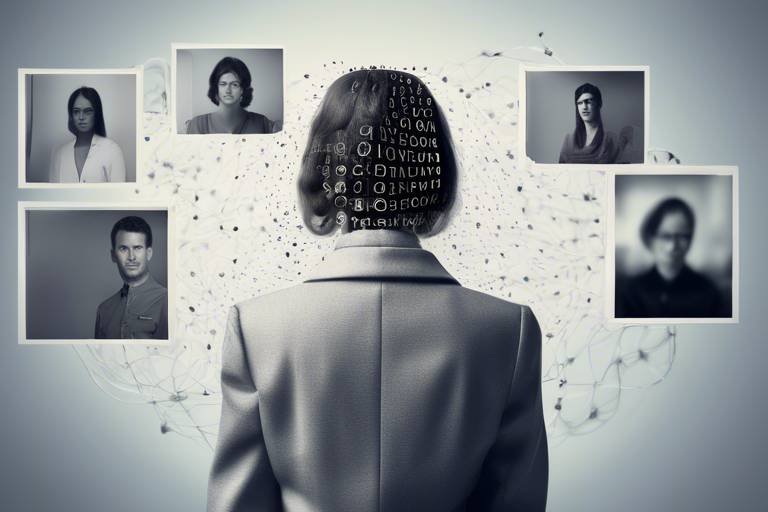A Call for Democratic AI Ethics
As we step into an era dominated by artificial intelligence, the conversation around AI ethics has never been more critical. Imagine a world where technology not only enhances our lives but also respects our fundamental rights and values. That’s the vision we should strive for—a world where AI serves humanity, rather than the other way around. But how do we ensure that this vision becomes a reality? The answer lies in embracing democratic principles in the development and implementation of AI systems.
When we talk about democratic AI ethics, we’re referring to a framework that prioritizes transparency, accountability, and inclusivity. These principles serve as the backbone for responsible AI usage, fostering an environment where technology can flourish while safeguarding the rights of individuals. Without this ethical foundation, AI risks becoming a tool that perpetuates existing inequalities and biases, rather than a force for good.
To put it simply, the stakes are high. As AI continues to evolve and integrate into various aspects of our lives—from healthcare to finance, and even our social interactions—it’s essential that we don’t lose sight of the human element. We must ask ourselves: Who benefits from these technologies? Are we creating systems that reflect the diversity of our society, or are we inadvertently reinforcing the status quo?
In this article, we will delve into the importance of AI ethics, explore the integration of democratic principles, and discuss how we can engage communities in shaping the future of AI. By the end of this journey, we hope to inspire a collective call to action—one that encourages all stakeholders to advocate for ethical standards in AI development.
Understanding AI ethics is crucial as it lays the groundwork for responsible technology use, ensuring that AI systems respect human rights and promote fairness in decision-making processes. When we think about ethics in AI, we often focus on the potential risks—privacy violations, algorithmic bias, and job displacement, to name a few. However, it’s important to also consider the opportunities that ethical AI presents. By prioritizing ethical considerations, we can create systems that not only mitigate harm but also drive positive social change.
Integrating democratic principles into AI development fosters transparency, accountability, and inclusivity, enabling diverse voices to shape the technology that impacts our lives and communities. This approach not only enhances trust but also encourages collaboration among various stakeholders, including developers, policymakers, and the public. By ensuring that everyone has a seat at the table, we can cultivate an environment where innovation thrives alongside ethical considerations.
Transparency in AI systems is essential for building trust among users, allowing stakeholders to understand how decisions are made and ensuring that algorithms operate without bias or discrimination. When individuals can see the inner workings of AI systems, they are more likely to trust the outcomes. This transparency can be achieved through various means, including:
- Open Data: Making datasets publicly available to encourage scrutiny and collaboration.
- Accessible Algorithms: Providing clear explanations and documentation for how algorithms function.
Utilizing open data and accessible algorithms can enhance transparency, enabling independent audits and fostering collaboration among researchers, policymakers, and the public to improve AI systems. This openness not only promotes accountability but also invites innovation, as diverse minds come together to refine and enhance AI technologies.
Engaging the public in discussions about AI ethics raises awareness and encourages informed dialogue, empowering individuals to advocate for ethical standards and practices in technology. Public forums, workshops, and online discussions can serve as platforms for sharing knowledge and concerns, ultimately leading to more robust AI policies that reflect the values of society.
Establishing accountability mechanisms ensures that developers and organizations are held responsible for the impacts of their AI systems, fostering ethical behavior and adherence to established guidelines. This accountability can take many forms, from regulatory frameworks to industry standards, all aimed at ensuring that AI is developed and used in ways that benefit society as a whole.
Promoting inclusivity in AI development involves diverse representation in design teams, ensuring that the perspectives of marginalized communities are considered and respected in technological advancements. When we include voices from all walks of life, we create AI systems that are not only more effective but also more equitable.
Encouraging community participation in AI projects allows for the incorporation of local knowledge and values, leading to more culturally relevant and socially responsible outcomes. By involving communities in the design process, we can ensure that AI technologies address real-world challenges and resonate with the people they are meant to serve.
Ensuring equitable access to AI technology is vital to prevent disparities, enabling all communities to benefit from advancements and participate in shaping the future of AI. This means addressing the digital divide and making sure that everyone, regardless of their background or resources, has the opportunity to engage with and benefit from AI innovations.
Exploring future directions in AI ethics involves anticipating challenges and opportunities, fostering collaborative efforts among stakeholders to create a sustainable and ethical AI landscape that serves humanity. As we look ahead, it’s clear that the conversation around AI ethics will continue to evolve, and it’s up to all of us to ensure that we steer it in a direction that prioritizes the well-being of individuals and communities.
What is AI ethics?
AI ethics refers to the moral principles and guidelines that govern the development and use of artificial intelligence technologies, ensuring they align with human values and rights.
Why are democratic principles important in AI?
Democratic principles such as transparency, accountability, and inclusivity help ensure that AI systems are developed with input from diverse voices, promoting fairness and reducing bias.
How can I get involved in AI ethics discussions?
You can participate in local forums, online discussions, and workshops focused on AI ethics to voice your opinions and learn from others.
What role does community participation play in AI development?
Community participation ensures that the needs and values of various groups are considered in AI projects, leading to more relevant and responsible technologies.

The Importance of AI Ethics
Understanding AI ethics is crucial as it lays the groundwork for responsible technology use. In a world increasingly driven by algorithms and data, we must ensure that these systems respect human rights and promote fairness in decision-making processes. Imagine a world where your choices are influenced by an invisible hand—an algorithm. Without ethical considerations, this hand could easily become biased, leading to outcomes that favor some while marginalizing others. That's why AI ethics isn't just a buzzword; it's a necessity.
At its core, AI ethics encompasses a broad range of issues, from privacy concerns to the potential for discrimination. For instance, if an AI system is trained on biased data, it will likely produce biased results, perpetuating existing inequalities. Therefore, understanding these ethical implications is essential for creating systems that are not only efficient but also just. We must ask ourselves: how can we harness the power of AI while ensuring it serves the greater good?
Furthermore, the importance of AI ethics extends beyond the technical realm; it touches on societal values and the kind of future we want to build. As we integrate AI into various sectors—from healthcare to finance—it's imperative that we establish guidelines that reflect our shared values. This is where the concept of democratic ethics comes into play. By fostering discussions that include diverse perspectives, we create a more holistic understanding of the implications of AI technologies.
To illustrate the significance of AI ethics, consider the following key areas:
- Human Rights: AI should enhance, not undermine, our fundamental rights.
- Fairness: Ethical AI promotes equitable treatment across different demographics.
- Transparency: Users should understand how AI systems make decisions that affect their lives.
- Accountability: Those who develop and deploy AI must be held responsible for its impact.
In conclusion, AI ethics is not just an afterthought; it's a vital component of technology development. As we continue to innovate, we must prioritize ethical considerations to ensure that AI serves humanity positively. The future of AI hinges on our ability to navigate these ethical waters, making it imperative for developers, policymakers, and society at large to come together in this endeavor.

Democratic Principles in AI
In the rapidly evolving world of artificial intelligence, the integration of democratic principles is not just a lofty ideal; it’s a necessity. As AI technologies continue to permeate every aspect of our lives—from healthcare to finance, and even social interactions—it's paramount that we ensure these systems reflect the values of transparency, accountability, and inclusivity. Imagine a world where technology is not just a tool for the privileged, but a communal resource that amplifies the voices of all stakeholders. This is the essence of democratic AI, where every individual has a say in how these powerful systems are designed and deployed.
By embedding democratic principles into the fabric of AI development, we create an environment where transparency is the norm rather than the exception. This means that AI systems should be designed in a way that their operations are understandable and accessible to the average user. When people can see how decisions are made, they are more likely to trust these systems. For instance, consider a healthcare AI that determines treatment plans. If patients and doctors can understand the underlying algorithms and data used, they can better evaluate the recommendations made by the system. This fosters a culture of trust and collaboration among users and developers alike.
Furthermore, accountability is a cornerstone of democratic AI. Establishing clear mechanisms for holding developers and organizations accountable for their AI systems is crucial. This means that if an AI system causes harm or perpetuates bias, there should be clear paths for redress and correction. Imagine a scenario where an AI used in hiring practices systematically disadvantages certain groups. Without accountability, such issues could persist unchecked. However, with democratic principles in place, stakeholders can demand answers and ensure that necessary changes are made.
Inclusivity in AI development is another vital aspect of embedding democratic principles. It’s essential that the teams designing AI systems are diverse and representative of the communities they serve. This diversity brings a wealth of perspectives and experiences that can inform more equitable and just AI solutions. For example, if a team developing facial recognition technology lacks representation from various ethnic backgrounds, the resulting algorithms may inadvertently favor certain demographics while marginalizing others. By promoting inclusivity, we can harness a broader range of insights and create AI systems that truly serve everyone.
To further illustrate the impact of democratic principles in AI, consider the following table that outlines the key components:
| Democratic Principle | Description | Impact on AI |
|---|---|---|
| Transparency | Making AI operations understandable and accessible | Builds trust and promotes informed usage |
| Accountability | Establishing mechanisms for responsibility | Ensures ethical behavior and rectifies harm |
| Inclusivity | Diverse representation in AI design teams | Leads to equitable and culturally relevant outcomes |
In conclusion, integrating democratic principles into AI development is not merely an ethical obligation; it’s a pathway to creating technology that genuinely benefits society. By championing transparency, accountability, and inclusivity, we can ensure that AI systems are designed with the best interests of all individuals in mind. This is not just about preventing harm; it’s about actively fostering a future where technology uplifts every voice and empowers every community.
- What are democratic principles in AI? Democratic principles in AI refer to the values of transparency, accountability, and inclusivity that guide the development and implementation of AI technologies.
- Why is transparency important in AI? Transparency is vital as it builds trust among users, allowing them to understand how decisions are made and ensuring that algorithms operate fairly.
- How can we ensure accountability in AI? Establishing clear accountability mechanisms ensures that developers and organizations are held responsible for the impacts of their AI systems.
- What role does inclusivity play in AI development? Inclusivity ensures diverse representation in design teams, allowing for the perspectives of marginalized communities to be considered in technological advancements.

Transparency in AI Systems
In today's rapidly evolving technological landscape, has become a cornerstone of ethical AI development. Imagine a world where machines make decisions that significantly affect our lives—wouldn't you want to know how those decisions are made? Transparency is not just a buzzword; it’s a necessity for fostering trust between AI systems and the people they serve. When users understand the underlying processes of AI operations, it reduces anxiety and fosters acceptance. After all, who wants to rely on a "black box" that spits out decisions without explanation?
One of the primary benefits of transparency is the ability to identify and mitigate biases in AI algorithms. When stakeholders can scrutinize how data is collected and how algorithms function, it opens the door to addressing potential inequalities. For example, if an AI system used in hiring processes shows a preference for candidates from specific demographics, transparency allows us to pinpoint where the bias originates. This leads to a crucial question: how can we ensure that AI systems operate fairly? The answer lies in the commitment to open data and accessible algorithms.
Utilizing open data and making algorithms publicly accessible are vital steps toward achieving transparency. By allowing independent audits of AI systems, we encourage collaboration among researchers, policymakers, and the public. This collective effort can significantly enhance the quality and fairness of AI technologies. Imagine a table that outlines the benefits of open data:
| Benefit | Description |
|---|---|
| Increased Trust | Users are more likely to trust AI systems when they can see how they work. |
| Bias Detection | Open access allows for the identification and correction of biases in algorithms. |
| Collaboration | Encourages partnerships between different sectors to improve AI systems. |
Furthermore, public engagement plays a crucial role in enhancing transparency. When communities are involved in discussions about AI ethics, it raises awareness and encourages informed dialogue. This empowers individuals to advocate for ethical standards and practices in technology. Think about it: when people are informed, they can better understand the implications of AI in their lives and demand accountability from developers.
Public engagement should not be an afterthought but rather a fundamental aspect of AI development. Workshops, community forums, and online platforms can serve as effective venues for sharing information and gathering feedback. By actively participating in these discussions, individuals can voice their concerns and suggestions, leading to a more ethical and transparent AI landscape. In essence, transparency is not just about revealing the workings of AI but also about creating a dialogue that includes diverse perspectives. This is how we can build a future where technology serves humanity, not the other way around.

Open Data and Algorithms
In today's rapidly evolving digital landscape, the concept of open data and algorithms has emerged as a cornerstone for fostering transparency and accountability in artificial intelligence (AI) systems. Imagine a world where the inner workings of AI are as clear as a crystal lake, where users can see through the murky waters of complex algorithms. This level of transparency is not merely a luxury; it is a necessity. By utilizing open data and accessible algorithms, we can significantly enhance the trustworthiness of AI technologies.
Open data refers to the practice of making data freely available to everyone, allowing for unrestricted access and use. When AI developers adopt this approach, they enable independent audits, which can help identify biases and inaccuracies in AI systems. This is crucial because, without transparency, how can we hold anyone accountable for the decisions made by these algorithms? The answer is that we cannot. This is where the integration of open data becomes essential.
Moreover, open algorithms serve as a beacon of hope for collaboration among various stakeholders, including researchers, policymakers, and the public. By making algorithms publicly accessible, we invite a diverse range of perspectives to scrutinize and improve them. This collaboration can lead to the development of more robust and fair AI systems. For instance, if a healthcare algorithm is open for public review, medical professionals and ethicists can contribute valuable insights that might not have been considered initially.
To illustrate the importance of open data and algorithms, consider the following table that highlights their benefits:
| Benefits | Description |
|---|---|
| Increased Trust | Open data allows users to see how decisions are made, fostering trust in AI systems. |
| Enhanced Collaboration | Accessibility invites various stakeholders to contribute to the improvement of AI technologies. |
| Bias Detection | Independent audits can identify and mitigate biases in AI algorithms. |
| Public Engagement | Encourages informed discussions about AI ethics and practices. |
But open data and algorithms are not just about transparency and collaboration; they also empower users. When individuals understand how AI systems operate, they can make informed decisions about their interactions with technology. This empowerment is crucial in a world where AI increasingly influences our lives, from social media feeds to job applications.
In conclusion, the integration of open data and algorithms into AI development is a vital step toward creating a more ethical and transparent technological landscape. By embracing openness, we not only enhance trust and collaboration but also ensure that AI systems are held accountable for their actions. This is not just a technical issue; it is a societal imperative that demands our attention and action.
- What is open data? Open data refers to data that is made freely available for anyone to access, use, and share.
- Why are open algorithms important? Open algorithms promote transparency, allowing for independent audits and improvements by various stakeholders.
- How can open data reduce bias in AI? By enabling independent reviews, open data helps identify biases that may exist in AI systems, leading to more fair outcomes.
- What role does public engagement play in AI ethics? Public engagement fosters informed discussions and empowers individuals to advocate for ethical standards in technology.

Public Engagement and Awareness
In a world increasingly dominated by technology, the significance of public engagement and awareness in the realm of artificial intelligence (AI) cannot be overstated. Imagine a community where everyone, from tech enthusiasts to everyday users, actively contributes to shaping the technologies that affect their lives. This vision can only become a reality when there is a concerted effort to inform and involve the public in discussions surrounding AI ethics. Why is this engagement so crucial? Because AI systems, when developed without public insight, can perpetuate biases and lead to decisions that do not reflect the values of the communities they serve.
Public engagement serves as a bridge between developers and users. It creates a space where individuals can voice their concerns, share their experiences, and offer insights that might otherwise be overlooked. For instance, consider a city implementing an AI-driven traffic management system. If the developers do not engage with the community, they might fail to recognize specific local traffic patterns or cultural nuances, leading to ineffective solutions. By engaging the public, developers can gather vital information that enhances the system’s effectiveness and ensures it meets the community's needs.
Moreover, raising awareness about AI ethics empowers individuals to advocate for their rights and demand accountability from organizations. When people understand how AI works and its potential implications, they are more likely to question and challenge practices that may be harmful or unjust. This kind of informed dialogue is essential for fostering a culture of ethical responsibility in technology. For example, public forums, workshops, and educational initiatives can be effective ways to disseminate knowledge and stimulate discussion about AI’s role in society.
To facilitate this engagement, several strategies can be employed:
- Workshops and Seminars: Hosting events that educate the public about AI technologies and ethical considerations can demystify complex concepts and encourage participation.
- Online Platforms: Utilizing social media and community forums allows for broader outreach and encourages dialogue among diverse groups.
- Collaborative Projects: Involving community members in AI projects ensures that their perspectives are integrated from the ground up.
Ultimately, fostering public engagement and awareness in AI ethics is not just about informing people; it's about building a community that actively participates in shaping the future of technology. By creating a culture of dialogue and collaboration, we can ensure that AI serves as a force for good, prioritizing the values of transparency, accountability, and inclusivity. As we move forward, let’s embrace the power of collective wisdom to guide the ethical development of AI technologies that reflect our shared humanity.
Q: Why is public engagement important in AI ethics?
A: Public engagement is crucial because it ensures that diverse perspectives are considered in AI development, leading to more equitable and effective technologies.
Q: How can individuals get involved in discussions about AI ethics?
A: Individuals can participate in community workshops, engage in online discussions, and advocate for transparency and accountability in AI systems.
Q: What role does education play in public engagement?
A: Education raises awareness about AI technologies and ethical considerations, empowering individuals to make informed decisions and advocate for their rights.

Accountability Mechanisms
In the rapidly evolving landscape of artificial intelligence, establishing is not just a regulatory requirement; it's a moral imperative. As AI systems increasingly influence decision-making in critical areas like healthcare, law enforcement, and finance, the question arises: who is responsible when things go wrong? This is where accountability mechanisms come into play, ensuring that developers and organizations are held accountable for the outcomes of their AI systems.
Imagine a world where AI systems operate without oversight, making decisions that could affect millions without any checks and balances. Sounds scary, right? That's why we need robust frameworks in place. These mechanisms can take various forms, including legal frameworks, ethical guidelines, and organizational policies. The goal is to create a culture of responsibility where stakeholders are aware of the potential impacts of their technologies.
One effective approach is the implementation of auditing processes. Regular audits can help identify biases or errors in AI systems, ensuring they operate fairly and transparently. For instance, a financial institution might conduct audits to assess how its AI algorithms make lending decisions, checking for any discriminatory practices that could harm marginalized communities. By making auditing a standard practice, organizations can demonstrate their commitment to ethical AI usage.
Moreover, accountability mechanisms should include clear paths for redress. If an AI system causes harm—whether it’s a wrongful arrest due to biased algorithms or a financial loss from an errant trading bot—there must be a way for affected individuals to seek justice. This could involve setting up independent review boards or ombudsman services that can investigate complaints and recommend corrective actions.
To really grasp the importance of these mechanisms, consider the following table that outlines potential accountability measures:
| Accountability Measure | Description |
|---|---|
| Regular Audits | Systematic evaluations of AI algorithms to identify biases and ensure compliance with ethical standards. |
| Transparency Reports | Publicly available documents detailing how AI systems operate, including data sources and decision-making processes. |
| Redress Mechanisms | Established processes for individuals to report grievances and seek compensation for harms caused by AI systems. |
| Ethics Committees | Internal or external bodies that review AI projects and ensure they align with ethical guidelines and community standards. |
It's also crucial for organizations to foster a culture of accountability within their teams. This means training developers and engineers not only on the technical aspects of AI but also on the ethical implications of their work. When team members understand the potential societal impacts of their projects, they are more likely to prioritize ethical considerations during the development process.
In conclusion, accountability mechanisms are essential to ensure that AI technologies are developed and used responsibly. By implementing auditing processes, creating clear paths for redress, and fostering a culture of accountability, we can work towards an AI landscape that is not only innovative but also ethical and just. As we continue to navigate the complexities of AI, let’s remember that with great power comes great responsibility.
- What are accountability mechanisms in AI? Accountability mechanisms are frameworks and processes that ensure developers and organizations are responsible for the outcomes of their AI systems.
- Why are audits important for AI systems? Audits help identify biases or errors in AI systems, ensuring they operate fairly and transparently.
- How can individuals seek redress for harms caused by AI? Individuals can report grievances through established processes like independent review boards or ombudsman services.
- What role do ethics committees play? Ethics committees review AI projects to ensure they align with ethical guidelines and community standards.

Inclusivity in AI Development
In today's rapidly evolving technological landscape, is not just a buzzword; it is a necessity. As artificial intelligence becomes more integrated into our daily lives, the need for diverse representation in the teams that create these systems is paramount. Imagine a world where the voices of all communities, especially those that have been historically marginalized, are not only heard but actively shape the technologies that influence their lives. This is the essence of inclusivity in AI.
When we think about AI, we often picture complex algorithms and advanced machine learning models. However, behind every algorithm lies a team of developers, data scientists, and designers. If these individuals come from similar backgrounds, their perspectives may inadvertently exclude the unique experiences and needs of various communities. This lack of representation can lead to biased AI systems that fail to serve everyone equally. For instance, if a facial recognition system is primarily developed by a homogenous group, it may not perform accurately for individuals of different ethnicities. This is a clear example of how a lack of inclusivity can have real-world consequences.
To combat these issues, organizations must actively seek to include a variety of voices in the development process. This can be achieved through:
- Diverse Hiring Practices: Companies should prioritize hiring individuals from different backgrounds, ensuring that teams reflect the diversity of the society they serve.
- Collaborative Design Processes: Engaging with community members during the design phase can provide invaluable insights that enhance the relevance and effectiveness of AI solutions.
- Feedback Mechanisms: Establishing channels for ongoing feedback from users can help developers understand the impact of their systems and make necessary adjustments.
Moreover, inclusivity in AI development isn't just about representation; it's also about creating an environment where all voices are valued. This means fostering a culture of respect and openness, where team members feel comfortable sharing their ideas and concerns. When diverse perspectives are welcomed, innovation flourishes. Think of it like a potluck dinner: each dish brings something unique to the table, and together they create a feast that is far more satisfying than any single dish could provide.
Another critical aspect of inclusivity is ensuring equitable access to technology. It's essential that all communities have the opportunity to benefit from advancements in AI. This can be achieved through targeted initiatives that provide resources and training to underrepresented groups, enabling them to participate in the tech industry. By doing so, we not only empower individuals but also enrich the field with a variety of experiences and viewpoints.
Ultimately, the goal of inclusivity in AI development is to create systems that are not only effective but also just and equitable. As we look to the future, we must ask ourselves: How can we ensure that our technological advancements serve everyone? The answer lies in embracing diversity, fostering collaboration, and committing to ongoing engagement with all communities. Only then can we build AI systems that truly reflect the values of our society.
What is inclusivity in AI development?
Inclusivity in AI development refers to the practice of ensuring diverse representation in the teams that create AI technologies, allowing for various perspectives to shape the outcomes of these systems.
Why is inclusivity important in AI?
Inclusivity is crucial because it helps prevent bias in AI systems, ensuring that they serve all communities fairly and equitably, rather than favoring one group over another.
How can organizations promote inclusivity in AI?
Organizations can promote inclusivity by implementing diverse hiring practices, engaging community members in the design process, and establishing feedback mechanisms to continuously improve their AI systems.
What role does community feedback play in AI development?
Community feedback is vital as it provides developers with insights into how their systems perform in real-world scenarios, helping them to make necessary adjustments and improvements.

Community Participation
Community participation is a vital component in the ethical development of artificial intelligence. Imagine a world where the voices of the people directly influence the technology that shapes their lives. This is not just a dream; it's a necessity. By actively involving communities in AI projects, we can harness local knowledge and values that are often overlooked by large corporations and tech giants. When communities have a seat at the table, the outcomes are not only more culturally relevant but also more socially responsible.
One way to facilitate community participation is through workshops and forums that invite individuals from various backgrounds to share their insights and experiences. These gatherings can serve as a platform for discussion, allowing community members to express their concerns, aspirations, and ideas regarding AI technologies. It’s crucial that these discussions are not just token gestures but are genuinely integrated into the decision-making processes of AI development. When people feel heard, they are more likely to engage with and support the technologies that emerge from these collaborations.
Moreover, community participation can also lead to the development of AI solutions that address specific local challenges. For instance, in a rural area facing agricultural issues, incorporating farmers’ knowledge into AI models can lead to innovations that directly benefit their livelihoods. This approach not only empowers the community but also ensures that the technology developed is practical and effective. By bridging the gap between technological advancement and community needs, we foster a sense of ownership and responsibility towards the outcomes of AI systems.
To illustrate the importance of community participation, consider the following table that outlines the key benefits:
| Benefit | Description |
|---|---|
| Enhanced Relevance | AI solutions are tailored to meet specific community needs, ensuring they are practical and effective. |
| Increased Trust | When communities are involved, they are more likely to trust the technologies being developed. |
| Diverse Perspectives | Incorporating a variety of voices leads to more comprehensive and equitable technological solutions. |
| Empowerment | Communities gain a sense of ownership over the AI systems that impact their lives. |
In conclusion, community participation is not just a checkbox in the AI development process; it is a fundamental aspect that can lead to more ethical, effective, and equitable AI technologies. By valuing and integrating the voices of the community, we can create a future where technology truly serves the people. The road ahead is not without challenges, but with collective effort and engagement, we can pave the way for a more inclusive and responsible AI landscape.
- Why is community participation important in AI development? Community participation ensures that the technologies developed are relevant and beneficial to the people they are meant to serve.
- How can communities get involved in AI projects? Communities can participate through workshops, forums, and collaborative projects that allow them to voice their needs and concerns.
- What are the potential outcomes of increased community involvement? Increased community involvement can lead to more effective solutions, greater trust in technology, and a stronger sense of ownership among community members.

Equitable Access to Technology
In today's rapidly evolving digital landscape, is not just a luxury; it is a fundamental right. Imagine a world where everyone, regardless of their socio-economic status, has the same opportunity to leverage the power of artificial intelligence (AI) to improve their lives. Unfortunately, we are far from that reality. Many communities, particularly those in underprivileged areas, face significant barriers that prevent them from accessing the latest technologies. This disparity can lead to a cycle of inequality that is hard to break.
To bridge this gap, we need to implement strategies that ensure all individuals can access AI technologies. One effective way to achieve this is through community-driven initiatives. These initiatives can provide resources, training, and support to marginalized groups, enabling them to harness technology for their own benefit. For instance, local tech hubs can serve as incubators for innovation, where community members can learn about AI, engage in projects, and develop solutions tailored to their specific needs.
Moreover, it's essential to consider the role of government policies in promoting equitable access. Policymakers must prioritize funding for technology infrastructure in underserved areas. By investing in broadband internet access and affordable devices, we can empower communities to connect and compete in the digital economy. The table below illustrates some key statistics regarding technology access across different demographics:
| Demographic | Access to Internet (%) | Access to Smart Devices (%) |
|---|---|---|
| Urban Areas | 95 | 90 |
| Rural Areas | 70 | 60 |
| Low-Income Households | 65 | 50 |
| High-Income Households | 98 | 95 |
As we can see, the disparities in access are glaring. To tackle these issues, we must also promote education and training programs that focus on technology literacy. Equipping individuals with the skills they need to navigate and utilize AI tools can significantly enhance their ability to participate in the digital economy. This can be achieved through partnerships between educational institutions, tech companies, and community organizations.
Finally, we should not underestimate the importance of advocacy and awareness. Raising public consciousness about the need for equitable access to technology can galvanize support for initiatives aimed at reducing disparities. Grassroots movements can play a pivotal role in highlighting these issues and pushing for meaningful change.
In conclusion, ensuring equitable access to technology is a multifaceted challenge that requires a collaborative approach. By investing in community initiatives, government policies, education, and advocacy, we can create a more inclusive landscape where everyone has the opportunity to thrive in the age of AI.
- What is equitable access to technology? Equitable access to technology refers to ensuring that all individuals, regardless of their socio-economic status, have the opportunity to access and benefit from technological advancements.
- Why is equitable access to AI important? It is crucial because it helps to prevent disparities and ensures that all communities can participate in and benefit from the digital economy.
- How can communities improve access to technology? Communities can improve access by creating local tech hubs, providing training and resources, and advocating for better infrastructure and policies.

Future Directions in AI Ethics
As we look ahead into the realm of artificial intelligence, it's crucial to consider the . The rapid evolution of AI technology presents both exciting opportunities and significant challenges. To navigate this complex landscape, we must engage in forward-thinking discussions that anticipate potential ethical dilemmas. It's like preparing for a storm; if we can predict the winds and the rain, we can build stronger shelters to protect ourselves.
One of the primary areas of focus should be the development of collaborative frameworks among various stakeholders, including technologists, ethicists, policymakers, and the public. This collaboration will ensure that diverse perspectives are considered, leading to more comprehensive ethical guidelines. Imagine a roundtable discussion where everyone has a voice; this is essential for fostering an environment where ethical AI can thrive.
Moreover, we must emphasize the importance of adaptive governance. As AI technologies evolve, so too should our ethical standards and regulations. This is not a one-time task but rather an ongoing process that requires vigilance and flexibility. Policymakers must be prepared to adjust regulations as new challenges arise, much like a gardener who must adapt their care for plants as the seasons change.
Furthermore, education plays a pivotal role in shaping the future of AI ethics. By integrating ethical considerations into STEM curricula, we can cultivate a new generation of technologists who are not only skilled in their fields but also socially responsible. Ethics should not be an afterthought but a foundational element of AI education. This approach can empower future innovators to think critically about the societal implications of their work.
To illustrate some of the potential future directions in AI ethics, consider the following table:
| Area of Focus | Description | Potential Impact |
|---|---|---|
| Collaborative Frameworks | Engaging diverse stakeholders in ethical discussions | More inclusive and comprehensive guidelines |
| Adaptive Governance | Flexible regulations that evolve with technology | Better responsiveness to emerging challenges |
| Education and Training | Integrating ethics into STEM education | Socially responsible technologists |
Additionally, we should not overlook the significance of global cooperation in establishing AI ethics. As AI technology transcends borders, it becomes imperative to create international standards that address ethical concerns on a global scale. This cooperative effort can help mitigate risks and ensure that AI benefits humanity as a whole, rather than just a select few. Think of it as a global treaty for technology; it requires commitment and collaboration from all nations.
Lastly, we must prioritize ongoing public engagement in the discourse surrounding AI ethics. As technology continues to permeate every aspect of our lives, it is essential that the public remains informed and involved. This can be achieved through community forums, educational initiatives, and transparent communication from AI developers. When people are informed, they can advocate for their rights and the ethical use of technology.
- What are the key challenges in AI ethics? The key challenges include bias in algorithms, lack of transparency, and ensuring accountability among developers.
- How can we ensure that AI benefits everyone? By promoting inclusivity and engaging diverse voices in the development process, we can create AI systems that serve the needs of all communities.
- Why is public engagement important in AI ethics? Public engagement fosters awareness and allows individuals to advocate for ethical standards, ensuring that technology aligns with societal values.
Frequently Asked Questions
- What is AI ethics and why is it important?
AI ethics refers to the moral principles that guide the development and implementation of artificial intelligence technologies. It's crucial because it ensures that AI systems respect human rights, promote fairness, and prevent harm. Without ethical considerations, AI could exacerbate inequalities and lead to biased decision-making.
- How do democratic principles apply to AI?
Democratic principles in AI involve transparency, accountability, and inclusivity. By integrating these values, we can ensure that AI technologies are developed in a way that reflects diverse perspectives and serves the public good. This means giving a voice to various stakeholders, including marginalized communities, in the decision-making process.
- What role does transparency play in AI systems?
Transparency is vital for building trust in AI systems. It allows users to understand how decisions are made and ensures that algorithms operate without bias. When AI systems are transparent, stakeholders can conduct independent audits and hold developers accountable for their actions.
- Why is public engagement important in AI ethics?
Public engagement raises awareness about AI ethics and encourages informed dialogue. When individuals are involved in discussions about technology, they can advocate for ethical standards and practices, ensuring that AI development aligns with societal values and needs.
- What are accountability mechanisms in AI?
Accountability mechanisms are processes that hold developers and organizations responsible for the impacts of their AI systems. These mechanisms foster ethical behavior by ensuring that there are consequences for unethical practices, thus promoting adherence to established guidelines.
- How can inclusivity be promoted in AI development?
Inclusivity can be promoted by ensuring diverse representation in design teams and actively involving marginalized communities in the development process. This approach leads to more culturally relevant and socially responsible AI technologies that better serve all segments of society.
- What is the significance of equitable access to AI technology?
Equitable access to AI technology is essential to prevent disparities and ensure that all communities can benefit from advancements. By enabling everyone to participate in shaping AI's future, we can create solutions that address the needs of diverse populations and promote social justice.
- What future challenges might AI ethics face?
Future challenges in AI ethics may include navigating the complexities of emerging technologies, addressing privacy concerns, and ensuring that AI systems do not perpetuate existing biases. Collaborative efforts among stakeholders will be crucial to tackle these challenges and create a sustainable, ethical AI landscape.



















